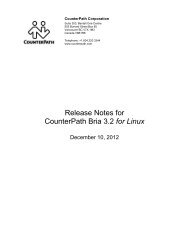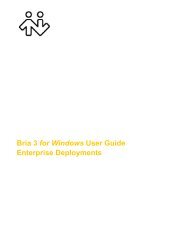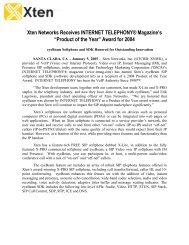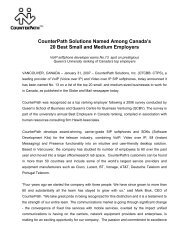Bria 3 Administrator Guide - CounterPath
Bria 3 Administrator Guide - CounterPath
Bria 3 Administrator Guide - CounterPath
Create successful ePaper yourself
Turn your PDF publications into a flip-book with our unique Google optimized e-Paper software.
<strong>CounterPath</strong> Corporation<br />
3.9 SIP Account Properties – Transport<br />
Table 8: SIP Account Properties – Security<br />
Field<br />
Description<br />
Signaling Transport • Automatic: <strong>Bria</strong> sets up the transport based on the capabilities of the network and the<br />
<strong>Bria</strong> computer. Choose this option if you do not care which transport is used.<br />
• TCP: This transport provides no signaling security.<br />
• UDP: This transport provides no signaling security.<br />
• TLS: Choose this option to request signaling encryption or both signaling and media<br />
encryption.<br />
Media Encryption over TLS See Table 9 on page 37.<br />
The factory setting is Do not allow encrypted call.<br />
Enable IPv6<br />
Generally, leave this field enabled to allow <strong>Bria</strong> to use IPv6 for phone calls and IMs. You<br />
may want to disable this field if you are currently upgrading your network to support IPv6,<br />
and you do not want your users to interfere with your test plans.<br />
You can set up <strong>Bria</strong> for the type of security (encryption) you want for incoming and outgoing calls.<br />
<strong>Bria</strong> supports:<br />
• Signaling encryption using TLS<br />
• Media encryption using SRTP.<br />
Setting up for Security outside of <strong>Bria</strong><br />
When using TLS, you must have the root certificate that signs the proxy's chain of certificates. In most cases,<br />
the root certification will already be installed. Procedures for the exchange of certificates are outside the scope<br />
of this documentation. The certificates must be stored on the <strong>Bria</strong> computer, in the root certificate store.<br />
Setting up the root certificate on your computer ensures that the connection to the proxy is TLS secure (the first<br />
hop). Any proxy in the chain (between you and the caller) that does not support TLS may cause an insecure link<br />
in the chain. Therefore, if the other party is outside your domain, you cannot be completely sure that the call is<br />
secured at the signaling level, which means that you cannot be sure that it is secured at the media level.<br />
36
















